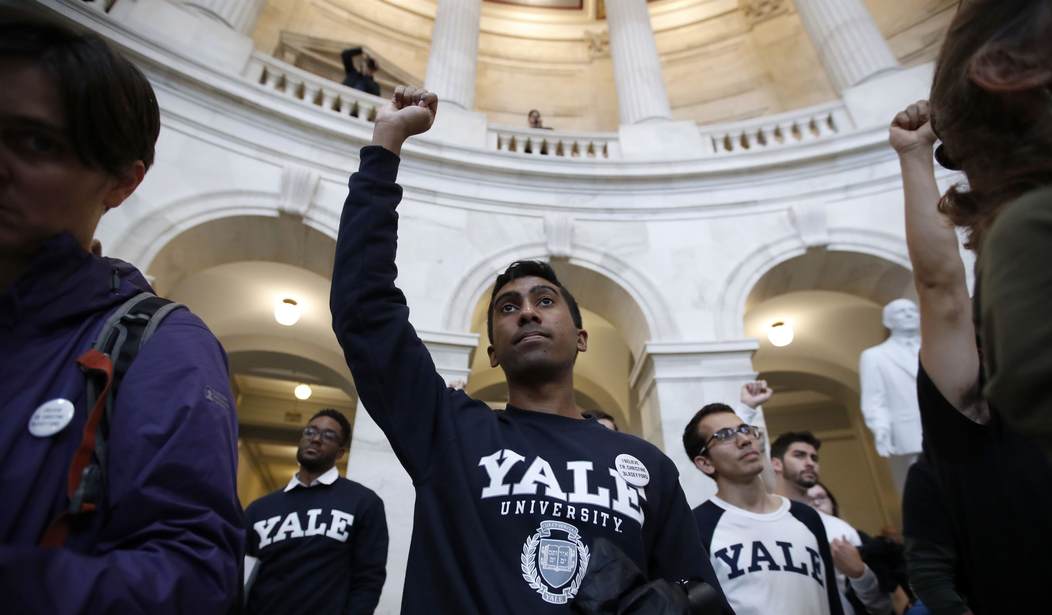The recent protest at Yale Law School and the similar one at UC Hastings Law School earlier this month are part of a growing trend. In the same way that views founded in critical race theory have been adopted in newsrooms and corporate settings, a similar transition is happening within the legal profession and at the nation’s law schools. CRT has gone from being a minority view to being mandatory. Aaron Sibarium, who broke the story about the Yale Law School protest for the Washington Free Beacon has a piece up today at Bari Weiss’ Substack about that transition.
Critical race theory, until quite recently, only had so much purchase in legal academia. The ideas of its founders—figures like Derrick Bell, Alan David Freeman, and Kimberlé Crenshaw—tended to have less influence on the law than on college students, who by 2015 seemed significantly less liberal (“small L”) than they used to be…
Then 2020 happened.
All of sudden, critical race theory was more than mainstream in America’s law schools. It was mandatory.
Starting this Fall, Georgetown Law School will require all students to take a class “on the importance of questioning the law’s neutrality”and assessing its “differential effects on subordinated groups,” according to university documents obtained by Common Sense. UC Irvine School of Law, University of Southern California Gould School of Law, Yeshiva University’s Cardozo School of Law, and Boston College Law School have implemented similar requirements. Other law schools are considering them.
As of last month, the American Bar Association is requiring all accredited law schools to “provide education to law students on bias, cross-cultural competency, and racism,” both at the start of law school and “at least once again before graduation.” That’s in addition to a mandatory legal ethics class, which must now instruct students that they have a duty as lawyers to “eliminate racism.”
At law schools, the number of DEI administrators continues to grow and the deans of these institutions are quick to embrace the new trends. Students who may have some doubts quickly learn to fall in line or face “social death.”
At Yale Law School, the Office of Student Affairs told students in an email last week that they could “swing by” the office to grab a “Critical Race Theory T-Shirt!” The T-shirt repeated the phrase “reparations & prison abolition” five times, Bart Simpson-style, before delivering the kicker: “critical race theory & yale law school.”…
A Harvard Law professor told me that students face “social death” if they buck the consensus. Students at other law schools—including Yale, NYU, Boston College, Georgetown, and Northwestern—told me much the same thing. “You want to have friends, so you don’t want to say anything controversial,” one Georgetown Law student explained.
At Boston College Law School this semester, a constitutional law professor asked students: “Who does not think we should scrap the constitution?” According to a student in the class, not a single person raised their hand.
Prison abolition and scrapping the constitution are truly fringe views. Maybe you could find 5% of Americans who would support either stance? But somehow, among law students, these fringe idea are now the default position. Anyone who disagrees from within the school faces social consequences. Anyone who disagrees from outside faces being deplatformed. We saw it happen twice this month at UC Hastings and at Yale. At Yale the panel did continue while the protesters did their best to disrupt it from a nearby hallway.
Professor Stith, who warned the Yale Law students that they were violating the school’s code of conduct regarding free speech (she told them to stop shouting and “grow up”) told Sibarium the problem went well beyond Yale.
“Law schools are in crisis,” she told me. “The truth doesn’t matter much. The game is to signal one’s virtue.”
I won’t go into all the detail but one of the side stories of the Yale Law School protest involved allegations by the protesters that armed police were called and that their presence put their minority members in danger just by being there. The Yale Law students who were trying to deplatform a speaker were also reflexively anti-police.
Eventually, the older, liberal professors like Stith will retire. At that point the new ideology seems destined to become truly dominant in the nation’s law schools. It’s hard to imagine what the legal profession will look like once it’s staffed with lawyers and judges who don’t really believe in free speech, who are openly hostile to police, who believe prisons and the constitution should be abolished and who see their role as correcting historical rather than present injustices. The future outcome of this experiment with the justice system could include a lot of unpleasant surprises.








Join the conversation as a VIP Member